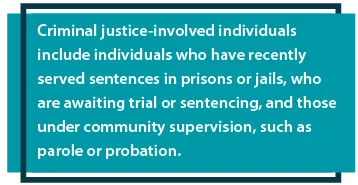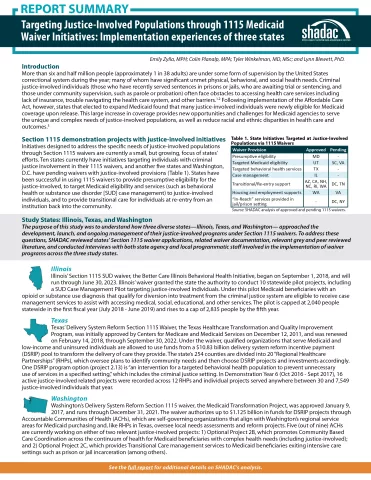New SHADAC Report on States Serving Justice-Involved Populations through Section 1115 Waivers
Under a Research in Transforming Health and Health Care Systems grant from the Robert Wood Johnson Foundation, SHADAC recently conducted a study of the ways in which states are using Section 1115 transformation waivers to test new approaches to serving individuals with criminal justice involvement.1
While each of the three states included in SHADAC’s study (Illinois, Texas, and Washington), faced unique financial, political, and economic dynamics when designing their respective 1115 waivers, states reported several similar factors that drove decisions to include justice-involved initiatives:
1) finding innovative ways to address the opioid crisis; 2) recognition of the justice-involved as a high-need, vulnerable population on which smaller scale initiatives could be piloted; and 3) recognition of justice-involved individuals as an important target for efforts to better integrate primary care and behavioral health.
About the Study
Ten states currently have initiatives targeting individuals with criminal justice involvement in their 1115 waivers, and another five states and Washington, D.C. have pending waivers with justice-involved provisions. States have been successful in using 1115 waivers to provide presumptive eligibility for the justice-involved, to target Medicaid eligibility and services to justice-involved individuals, and to provide transitional care for individuals at re-entry from an institution back into the community.
SHADAC’s study sought to understand how three diverse states—Illinois, Texas, and Washington— approached the development, launch, and ongoing management of their justice-involved programs under Section 1115 waivers. To address these questions, SHADAC reviewed states’ Section 1115 waiver applications, related waiver documentation, relevant grey and peer reviewed literature, and conducted interviews with both state agency and local programmatic staff involved in the implementation of waiver programs across the study states.
Key Report Themes
Interview responses across the three states revealed several key themes as they related to common facilitators and challenges during the waiver implementation process, as well as pros and cons of the waiver itself as a mechanism for transformation.
Successful implementation of justice-involved initiatives in all three study states involved:
- Significant coordination among multiple stakeholders, especially law enforcements
- Drawing on stakeholders’ previous experience with justice-involved grants
- Leveraging existing infrastructure
Stakeholders also reported many similar barriers and challenges in carrying out their work, including:
- Aligning goals of the multiple sectors that interact with justice-involved populations
- Placing culturally competent program staff in criminal justice settings
- Addressing privacy and security concerns related to sharing data among various sectors, and also capabilities of partners to perform data analysis that could prove the value of the work
Some individuals were especially hopeful that investing waiver resources in new infrastructure would help identify and reduce health disparities that have long existed in this population. Stakeholders also felt that 1115 waiver forced their partners to be more collaborative,
The small size of the target population meant that specific justice-involved issues were not necessarily at the forefront of waiver discussions and community partners felt that required waiver reporting was administratively complex and burdensome. Stakeholders also expressed concerns that waiver reimbursement methods and corresponding evaluation metrics wouldn’t adequately reflect the success of a justice-involved initiative.
However, they ultimately felt that efforts to undertake such programs were worthwhile because the waiver expanded access to services that would not otherwise be available to a high-need population.
Looking to the Future
Ensuring the sustainability of any justice-involved initiative implemented under a state’s 1115 waiver was a major focus of all the stakeholders. Stakeholders advocated bringing together multiple parties early and often to discuss sustainability of the project after the waiver ends—including structuring a supportive staffing model, collecting needed data to conduct return-on-investment analyses, securing the participation of other payers, and setting up an adequate reimbursement structure and value-based payment bundles reflective of population needs.
The experiences of stakeholders in Illinois, Texas, and Washington can be helpful to other states as they consider whether to implement programs aimed at individuals involved in the criminal justice system via Section 1115 Medicaid waivers.
[1] Criminal justice-involved individuals include individuals who have recently served sentences in prisons or jails, who are awaiting trial or sentencing, and those under community supervision, such as parole or probation.



